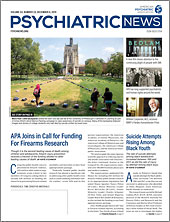In August, Surgeon General Jerome M. Adams, M.S., M.P.H., issued an advisory flagging marijuana as a danger to adolescents and pregnant women. The advisory emphasized that the developing brain is particularly vulnerable to the effects of THC (delta-9-tetrahydrocannabinol), the component that induces feelings of euphoria and is responsible for the experience of “getting high.” Mounting evidence shows that for the developing fetus, marijuana use can have adverse effects such as low birthweight; for adolescents, it can result in deficits in attention, memory, decision making, and motivation.
The advisory was spurred by increased access to marijuana and concerns about its potency: The THC in cultivated marijuana plants inceased from 4% to 12% between 1995 and 2014. For adolescents, especially those who start using marijuana at a younger age, the higher the THC concentration, the greater the risks are for addiction and other negative outcomes, such as anxiety, agitation, paranoia, and even psychosis, the advisory noted.
According to Smita Das, M.D., Ph.D., M.P.H., who conducts addiction research at Stanford University and is the medical director of psychiatry at Lyra Health, as well as a member of the APA’s Council on Addiction Psychiatry, there is a need among psychiatrists for guidance on how best to approach the subject of cannabis use with patients. “The advisory … presents a good entry point for discussions with patients and families about the risks of cannabis on the developing brain,” she told Psychiatric News.
Staci Gruber, Ph.D., director of the Cognitive and Clinical Neuroimaging Core and Marijuana Investigations for Neuroscientific Discovery at McLean Hospital in Boston and an associate professor of psychiatry at Harvard, agreed. She added that “people are desperate for information, especially since the nation has warmed significantly toward using cannabis for a variety of different problems.” For example, she explained, pregnant women may turn to marijuana in an attempt to reduce symptoms of nausea and vomiting that come with morning sickness. “But using marijuana for this purpose is not without risk because the THC can be passed to the unborn child,” Gruber said.
Statistics on marijuana use among pregnant women highlight the cause for concern. According to a survey conducted by Nora Volkow, M.D., director of the National Institute on Drug Abuse, and colleagues, published in June in JAMA, the number of pregnant women who used marijuana monthly rose from 3.4% in 2002 to 7% in 2017. Among women in their first trimester, monthly marijuana use rose from 5.7% in 2002 to 12.1% in 2017. The evidence of growing use of marijuana in this population prompted both the American College of Obstetricians and Gynecologists and the American Academy of Pediatrics to issue strong warnings against marijuana use during pregnancy.
The number of youth using marijuana is also of concern. The 2017 National Survey on Drug Use and Health found that about 9.2 million young people between the ages of 12 and 15 reported using marijuana within the past month. Equally concerning is that in recent years, adolescents’ perception of harm caused by marijuana has been declining, perhaps because of the growing number of states that have legalized its use for adults. However, marijuana is illegal at both the state and federal levels for young people.
“There’s no question that for brains under development, cannabis use has a negative impact, and the effects can show up over time,” said Gruber. “For those under the age of 16 who are chronic, heavy users, the effect on executive functioning can be significant.”
The surgeon general’s advisory is the first step of a messaging campaign and programs aimed at prevention. For psychiatrists, the document has particular value. “It gives them evidence at their fingertips to explain the risks of cannabis use,” Das said. “It also may be a starting point for discussing [a patient’s] interest in reducing marijuana use or quitting altogether.”
Gruber, too, thinks the document is important. “It’s an unregulated market out there,” she said. “While in many circumstances, medical marijuana may prove to be beneficial, at this point, there are many unknowns. If the marijuana has not been certified by a physician, the best course of action for most people is to just say no.” ■
The surgeon general’s advisory is posted
here. The
JAMA article, “Self-reported Medical and Nonmedical Cannabis Use Among Pregnant Women in the United States,” is posted
here.

